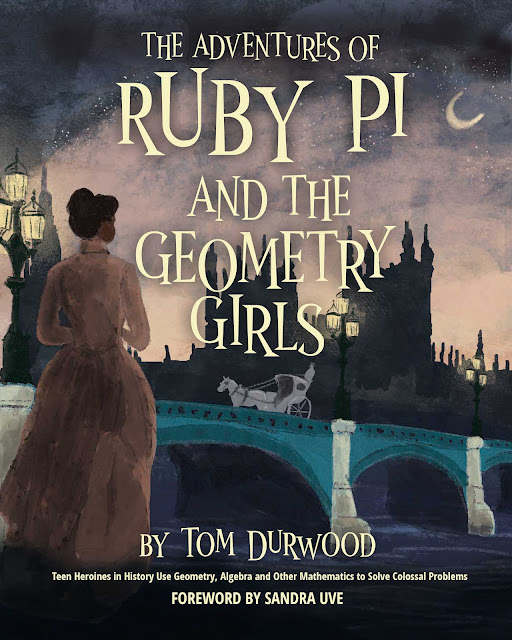1. ISOKE AND THE SLAYERS
In African history, we have evidence of counting
and numeration systems, games and puzzles, geometry,
graphs, record‐keeping, money, weights, and measures, etc.
-- Paulus Gerdes, A History of Mathematics In Africa
“Come!” urged Isoke. “We can’t be late!”
The first day of the Igue festival was in full swing.
With a grunt, the girl shouldered one of the ropes.
“The Mundari are thoughtless merchants. They’ll let their best calves go first-- ”
She pulled the big-wheeled cart through the festival grounds.
Six of her brothers pulled alongside her.
“You’re a long way from home, umngeele,” called a smiling Xhosa woman standing before a tiger- patterned curtain. She used a term that meant something between “borderlander” and “boon-docker.” She waved invitingly.
“Save some time for me on the way back,” Simtho told her. She laughed. The other brothers, even grim-faced Ypiku, enjoyed this exchange.
The little outlander family, led by the skinny girl Isoke, made their way past the vendors’ stands and the livestock pens and the tapestry displays.
Isoke had visited the grounds the night before, to map out their route.
The festival grounds were a celebration of symbols and numbers – different tribes’ runes and patterns spoke of beliefs, cosmology, rituals, totem birds and animals. Seers threw sign-marked rune-stones and announced destinies. Hooded hawks perched on their masters’ arms. Teams of boys jousted, their patterned vests identifying each clan. A tethered panther paced to and fro in a large cage, its eyes resting on passers-by.
The fair seemed boundless. They could only see parts of the whole.
“Stay strong, brothers!”urged the girl. “We are almost there -- ”
Only fourteen years old, Isoke was the matriarch of her clan and the acting chieftain of the Atakora, a small, once- undisciplined tribe of hunters in the remote Cotinou region, on the eastern peripheries of the kingdoms of Benin.
They wore their bows and shields on their backs, for all outlanders are hunters, and all hunters care to keep their weapons close by.
“Here we go – this way -- ”
Isoke had been saving for over a year to buy a bull-calf, to sire the village’s heifers. A healthy herd would change the fortunes of her people, that much she knew. She was determined to do right. Her ingenious new design for the baskets was water-tight and had become much-favored among the river tribes. As word spread and others came to see, and acquire, the baskets, she had been able to collect two bags full of sarafu, the coins forged by the brass workers of Igbo Ukwu, coins which the traders of the steppes used as currency. These she would use to buy a fine bull-calf.
The Mundari bred a handsome line of cattle.
“There!” called Isoke. “The Mundari pennants are just beyond -- ”
They rounded a corner.
They had come to a sort of open space, or plaza.
It was the royal court.
They saw Nala, Queen of the Benin lands, the festival’s hostess, as she sat presiding over dances and livestock displays and various goings-on.
Beside her stood the wiry Portuguese, her most trusted advisor.
Behind Nala’s throne stood the royal guard, fine strong warriors in their war paint and feathered head-gear and imposing shields.
Around the perimeters of the plaza were arranged the Queen’s closest allies, some of the most powerful tribes of the Benin nation.
Isoke suddenly stopped.
Something is wrong …
“Why are we stopping?” asked Osahar angrily.
Isoke crouched and held her left hand high.
She fisted the hand.
Now a second time. …
Simtho, who was closest to Isoke in age and temperament, saw that his sister’s shoulders were tensed, trembling slightly.
“Something is very, very wrong,” murmured the girl.
With a signal, she bade her brothers notch their bows.
They did so on the instant, not asking why.
On their left, at the head of the plaza, was the royal court –
On their right, among the assembled wagons, stood a broad-berthed cart. Its open bay concealed behind a tapestry of moons and stars.
Without warning a blood-curdling scream tore from behind the curtain.
The tapestry was ripped away --
A clutch of roaring painted warriors appeared in its place.
The assassins burst out, spears raised, ‘DEATH TO NALA!!’ on their lips --
Isoke ran straight at them --
“Wait! Wait!” cried Ypiku, the eldest of her brothers, the cautious, rule-abiding first born --
But there was no waiting.
There never is. In a real life, the most fateful events can unfold at the snap of a finger –
The ragged-toothed assassins were young and big-shouldered, fearful killers bristling with knives. One wielded a short-sword, of the European fashion.
They wore leopard skins.
Isoke grabbed a torch from the Xhosa and hurled it crossways, to trip the slayers as they advanced.
Three of them toppled.
A round of her brothers’ arrows struck down the front-line assassins before they had closed half the distance across the plaza –
A slayer hurled a spear directly at Queen Nala --
Nala, a tall, fierce woman, plucked the spear from its trajectory mid-air and returned it with force.
It impaled its bearer with a ‘Thunk!’--
Now the Portagee swept a pair of pistols from his waistband, aimed and fired with loud double ‘Booms! --
Two slayers descended on Isoke, who had drawn a blade of her own --
Osahar appeared. He stood in front of his sister, shielding her –
Osahar kicked one slayer’s legs out from under him and garroted the second with his bow-string, until the bow snapped --
The royal guard, unused to actual fighting, fled --
The Queen threw herself into the shield-splintering melee.
The Portagee’s sword flashed cleverly.
Half-mad with frenzy, brave Simtho leapt on the back of a slayer, only to earn a deep wound in the shoulder for the effort --
But the leopard skins had planned poorly, for now – now that their initial rush had been blunted – they were trapped.
Now a dash of hunters from the Yoruba and Xhosa and (surprisingly!) Swahili delegations ran to the aid of their Queen --
For a long moment all was confusion and blood-lust. Terrible cries and shouts of Surrender! rose. The pretend-warriors who brag of their deeds but care not to wield a sword when blood is spilled huddled behind the throne.
It ended in a moment, as it had started.
And when the deadly combat had stilled, and when the dust and smoke had settled, it was the scrawny border girl, Isoke, who stood in the center of the plaza, still and tall among the fallen.
Shivering hilts and bloody spears and moaning bodies surrounded her.
In the distance, drums started up.
Isoke surveyed the square.
Now a war chant rose, in celebration of Queen Nala’s great victory, and the selfless bravery of her subjects.
The Portagee raised his sword in salute.
He shook his weapon.
“How did you know?” he called to Isoke. “What gave them away?”
She wiped her blade on the fabric of her skirt.
“Geometry,” the border girl replied.










.png)


